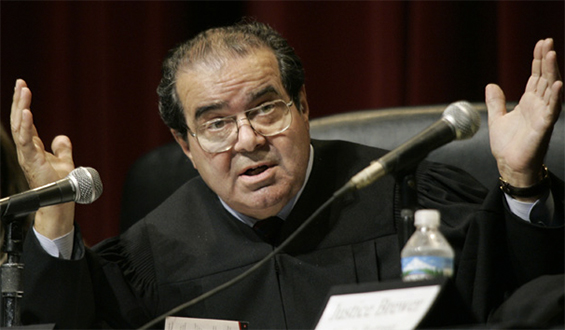
United States Supreme Court Justice Antonin Scalia has often been called one of the most outspoken and frank members of the Supreme Court. This week he once again showed just how he gained such a reputation when he made the suggestion that African American students should attend less-demanding schools.
According to Greg Stohr from Bloomberg, Scalia “grabbed the spotlight during Wednesday’s debate over college affirmative action programs when he said that perhaps the University of Texas “ought to have fewer” racial minorities.”
The comments came after the Supreme Court heard testimony from Abigail Fisher, a white student who claims that she was unable to attend the University of Texas because of her race. Tierney Sneed of Talking Points shares that Fisher contends her rejection of admission to the school because of her race is unconstitutional. Fisher instead graduated from Louisiana State University. Dan Roberts of The Guardian explained the court’s response, a suggestion that the number of students on college campuses in the US from minority groups could drop dramatically if Fisher wins her case.
Scalia expressed his feelings that this was not such a bad thing. He suggested that African American students would perform better in school if they were not “pushed ahead too fast,” and added that these minority students should attend “lesser schools.” He shared that having fewer African Americans attending the University of Texas would not bother him and even conveyed his opinion that perhaps there should be fewer. He then stated:
“And maybe, when you take more, the number of blacks, really competent blacks, admitted to lesser schools, turns out to be less. I don’t think it stands to reason that it’s a good thing for the University of Texas to admit as many blacks as possible.”
Scalia’s reasoning is that ensuring students are in institutions of appropriate difficulty results in a better, more productive experience:
“There are those who contend that it does not benefit African Americans to get them into the University of Texas where they do not do well, as opposed to having them go to a less-advanced school, a slower-track school, where they do well. One of the [legal]briefs pointed out that most of the black scientists in this country don’t come from schools like the University of Texas. They come from lesser schools where they do not feel that they’re being pushed ahead in classes that are too fast for them.”
While many are quick to voice their disagreement with Scalia, Tal Kopan of CNN reports that Carrie Severino defended Scalia, saying that he did not mean to imply that minority students are inferior. Severino, a former clerk for Justice Clarence Thomas and current Chief Counsel for the Judicial Crisis Network, explained that Scalia was referring to the “mismatch theory.” This theory states that if colleges admit students who aren’t prepared for that particular school on an academic level, then those students are less likely to perform well.
Joe Tacopino of the New York Post explains that Edward Blum, an activist who opposes racial preferences, recruited Fisher.
The Supreme Court is weighing the challenge to the school’s use of race as one of the factors for admission. This year marks the second time that the Supreme Court has heard her case. The higher court sent it back to a lower court in 2013. That court ruled in the college’s favor in 2014.




